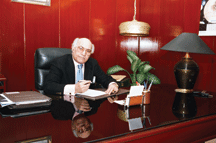
Companies achieve growth for any number of reasons. The right opportunities at the right time, a solid business plan, qualified and competent human resource, highly efficient systems in place and so forth. But there is something else too; a key ingredient that not only assures growth but which clearly differentiates a company from its competitors. And this is the leadership and the vision the leadership holds.
We are not talking about the often clich?d Vision statement that adorns company reports and is displayed on a board in the reception area. Take half a dozen vision statements from half a dozen companies involved in diverse businesses, and you will be amazed at how little these are different from each other. What does this mean? Are all these companies fired up with practically the same majestic vision? Grandiosely worded, the typical vision statement is something that someone dreamt up a long time ago and which hardly anyone in the company now can remember exactly if asked to repeat ad verbatim. It’s there because it fits the form. But what about the substance?
Humans should first of all create a purpose for themselves and then be accountable to themselves for it
The Leader’s DNA
The substance comes from what I can only call the real vision. The thought process of the leadership that combines a thorough understanding of the business, the acumen for finding solutions, a spirit to take on challenges and a foresight to think years ahead. It is this vision of the company leadership that will set what may initially seem impossible goals and then provide the guidance to achieve these goals.
Khawar Masood Butt is one corporate head who exemplifies this leadership genre. A classic case-study entrepreneur, Butt believes his greatest attribute has been to never default on a commitment, whether it is a commitment to his bank to repay a loan on time, or a commitment never to compromise on the quality of products his enterprise produces. But perhaps the greatest commitment as far as he is concerned, should be made to oneself.
“Humans should first of all create a purpose for themselves and then be accountable to themselves for it,” he states with deep conviction. Butt links this self-purpose creation to corporate social responsibility too. His thought on the matter is clear – individual character development at the leadership level is a pre-condition to exhibiting corporate social responsibility. At the end of the day, it is people who must execute a company’s CSR programme. So to start with, it is the people (leaders) who must have a purpose for themselves, a set of values they believe in and practice, and a commitment to their vision. Then they can go on to cascade this life philosophy to their employees and according to Butt, to everyone else who is directly or indirectly connected to the company’s business.
Value Chain Responsibility
Thus he sees that an integral part of corporate social responsibility is also to create a sense of responsibility in others: For example in the company’s value chain. His company, English Biscuit Manufacturers (EBM) is Pakistan?s largest biscuit manufacturer by far, adding a new plant every year since 2003. Creating a consciousness for responsibility in the value chain translates practically into EBM R&D teams getting involved with raw materials suppliers to ensure high quality and what he calls ‘constancy’ of quality. Similarly EBM spends both time and money to ensure that distributors’ warehouses have the required infrastructure to ensure the quality of product is not compromised while stored in the warehouses.
The ‘Living’ Company
Butt’s vision for his company dates back to 1969 when he took over EBM, and 4 decades later his initial thoughts still form the foundation of the company’s operations. He believes that a company should have a persona like a human being. It has to be what he calls a ‘living company’ with a mind, body and soul and he sees the life giving elements to be the company’s resources – shareholders, management and work force. Just like a human being adapts to its environment, a company too needs to fully understand what environment surrounds it, what are the changing needs and then accept this change. He believes a company needs to combine sensitivity its environment with a strong sense of identity, and display a powerful drive for progress that enables it to change and adapt without compromising its cherished core ideal or shirking its responsibilities.
At the same time he espouses that companies should establish a culture of collective responsibility. CSR he feels can make a much more substantial impact if companies combine their resources and specific skills to collectively address issues.
Just like a human being adapts to its environment, a company too needs to fully understand what environment surrounds it, what are the changing needs and then accept this change
Looking Ahead
The reflections of Khawar Butt indeed need to be thought over a few times to appreciate their implications in practice. Certainly his thought that CSR must include also creating responsibility in others has a somewhat deeper meaning than merely strengthening your supply chain. Entrepreneurs perhaps tend to think a little differently and certainly some of the most enviable success stories of our times, from Bill Gates to Richard Branson, have been achieved by entrepreneurs. Butt aptly defines entrepreneurship as identifying an opportunity, creating the resources and managing the risk. Bold decisions is what he feels are required for success.
And again like a true entrepreneur, he is optimistic about the future, looking ahead at 2020. He is convinced that every crisis has an opportunity built in which can be fully utilized, “provided we are geared up for it and that?s the key.”






